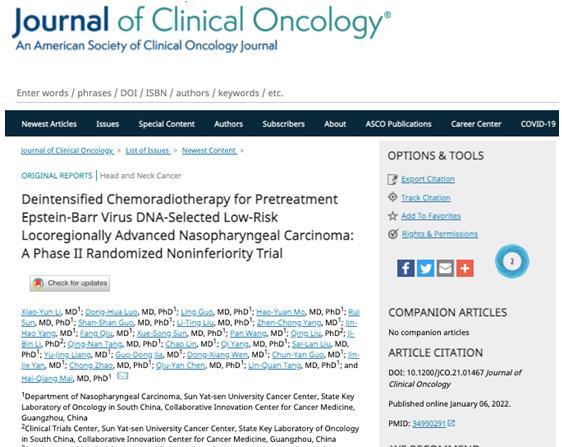Text/Yangcheng Evening News all-media reporter Chen Hui
Correspondent Zhao Xianting Chen Xun Wen Chaoyang
Photo/Courtesy of respondents
gospel! Professor Mai Haiqiang's team of the Cancer Prevention and Control Center of Sun Yat-sen University confirmed for the first time globally that plasma EBV DNA can effectively screen low-risk patients with localized advanced nasopharyngeal carcinoma, and for this part of the patients, the efficacy of the two courses of cisplatin concurrent radiotherapy and chemotherapy is comparable to that of the three courses, and the toxic side effects are significantly reduced, and the long-term quality of life of patients is improved. This study is the first international dose reduction study for low-risk patients with nasopharyngeal cancer, and provides evidence-based medical evidence for the optimization of individualized treatment strategies for nasopharyngeal carcinoma guided by plasma EBV DNA.

The study was published online in the Journal of Clinical Oncology
High-intensity treatment is also a double-edged sword
As a high incidence of nasopharyngeal carcinoma in South China, its incidence rate in some parts of South China is more than 20 times the global average, which seriously threatens the life and health of people in South China. Simultaneous chemoplatin-based combination therapy is the standard treatment model for localized advanced NASOPHARY. In recent years, with the advancement of radiotherapy technology and the improvement of the level of diagnosis and treatment of nasopharyngeal cancer, the cure rate of nasopharyngeal cancer has been greatly improved, and its three-year progression-free survival rate can exceed 80%. However, high-intensity treatment is also a double-edged sword. At present, cisplatin chemotherapy is used as the standard protocol for chemotherapy every 3 weeks, a total of three courses. Adverse reactions such as nausea, vomiting, electrolyte disorders, and hearing impairment caused by the chemotherapy drug cisplatin have brought great physical and mental burdens to patients, seriously damaged the quality of life and treatment compliance of patients, and become a clinically difficult treatment problem.
It is expected to rewrite the treatment guidelines for clinical nasopharyngeal carcinoma
In order to reduce the therapeutic toxicity of the drug without affecting the efficacy, Professor Mak Haiqiang's team took the lead in carrying out a randomized controlled, phase II chemotherapy dose reduction study for low-risk localized advanced nasopharyngeal carcinoma. This study screened patients with low-risk localized nasopharyngeal carcinoma of plasma EBV DNAl, compared the non-inferior efficacy and safety of cisplatin concurrent chemotherapy between two courses and three courses (standard protocol), and for the first time confirmed that the efficacy of two courses of concurrent chemoradiotherapy and chemotherapy was comparable to that of three courses, and reduced the toxic side effects of treatment while ensuring efficacy.
Professor Haiqiang Mak's team
The research results of Professor Maich Haiqiang's team are the first prospective dose reduction study in the world for patients with low-risk localized advanced nasopharyngeal carcinoma, and the research results affirm the important value of using plasma EBV DNA to stratify the risk of nasopharyngeal cancer patients and guide the personalized treatment of nasopharyngeal cancer. At the same time, the results confirmed the feasibility of two courses of cisplatin concurrent chemoradiotherapy for the treatment of low-risk nasopharyngeal cancer patients, and provided clear evidence-based medical evidence, which has very important practical clinical guidance significance. The results of the study provide a basis for further large-scale phase III clinical trials, and it is expected to rewrite the treatment guidelines for clinical nasopharyngeal cancer in the future to benefit the majority of patients.
Recently, the Journal of Clinical Oncology, an authoritative journal in the field of global oncology, published this phase II randomized clinical study of the dose reduction of low-risk localized regional advanced nasopharyngeal carcinoma online. (For more news, please pay attention to Yangcheng Pie pai.ycwb.com)
Source | Yangcheng Evening News Yangcheng Pie
Editor-in-charge | Liu Xinyu